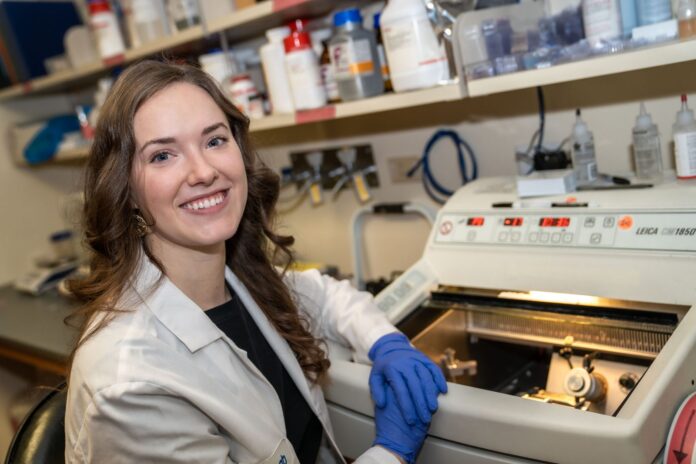Currently, VTCSOM-enrolled students wishing to pursue a Ph.D. with the TBMH program apply to both programs separately. It is expected that students will take three full years of leave from medical school to complete their Ph.D. coursework and dissertation.
The program allows students to pursue their passions in both clinical medicine and translational research, training the next generation of physician-scientists.
“We are delighted that Katelyn was selected to receive this prestigious award to support her M.D./Ph.D. training,” said Lee Learman, dean of the medical school. “Our intensive research requirement as a value-added domain of the curriculum attracts students, like Katelyn, who are interested in physician-scientist careers. We are planning to launch a formal M.D./Ph.D. program in the coming years so that more VTCSOM students will have this opportunity.”
Stebbins’ research focuses on the brain’s important yet poorly understood visual processing center: the ventral lateral geniculate nucleus (vLGN).
Spanning just a few hundred micrometers in mice, the vLGN receives signals from the eye but doesn’t form images. Instead, recent research has pointed to the region’s role in controlling circadian rhythms, mood, eye movement, and instinctual fear responses, but the specific cells and circuits responsible remain a mystery.
Stebbins wants to change that. Combining transcriptomics, bioinformatics, molecular biology, genetics, and viral approaches, she aims to map out the vLGN’s cellular and molecular structure.
“The more we learn about this brain region, the more remains left to discover. My goal is to fill in those gaps so we can identify precise cells, understand their developmental changes and molecular characteristics,” said Stebbins, who conducts her research in the institute’s Center for Neurobiology Research. “Once we can grasp how this brain region is made, how it works, and what it does, there may be an opportunity to design targeted therapeutic interventions involving these processing pathways.”
Her project builds on research conducted in the lab of Michael Fox, a former professor at the research institute, and by TBMH program alumnus Ubadah Sabbagh, who is now a postdoctoral associate at MIT’s McGovern Institute for Brain Research. Fox continues to mentor Stebbins from his new post as dean of the College of Science at the University of Massachusetts, along with a cohort of principal investigators at the research institute and medical school faculty working at Carilion Clinic.
Stebbins has already completed two years of medical school and plans to defend her doctoral dissertation in 2025. Once she’s finished her TBMH doctoral degree, she’ll transition to clinical rotations for her third and fourth years of medical school to complete her medical degree. One day, she hopes to work for an academic medical center where she can see patients, lead a neuroscience lab, and teach the next generation of physician-scientists.
She said her training, supportive mentorship, infrastructure, research community, and curriculum at Virginia Tech have positioned her for success.
“I can’t imagine a better place to be doing my M.D. and Ph.D. VTCSOM’s focus on research and TBMH’s focus on clinically relevant science makes for a flawless transition between the two,” Stebbins said.
In a first for Virginia Tech, M.D./Ph.D. Degree Program student Katelyn Stebbins has received a National Institutes of Health Ruth L. Kirschstein National Research Service Award F30 award for her neurobiology research.
The fellowship is a competitive grant designed to enrich the integrated research and clinical training of pre-doctoral dual-degree students at institutions funded by the National Institutes of Health.
Stebbins’ award covers her remaining while providing tuition support for completion of the medical degree at the Virginia Tech Carilion School of Medicine (VTCSOM) as well as her doctoral research in Virginia Tech’s Translational Biology, Medicine, and Health (TBMH) Graduate Program, which she’s completing at the Fralin Biomedical Research Institute at VTC.
“Katelyn’s outstanding achievement and hard work highlight the excellence of our students, our supportive academic community, and the esteemed national reputation of our programs here at Virginia Tech,” said Michael Friedlander, vice president for health sciences and technology, executive director of the Fralin Biomedical Research Institute, and the medical school’s senior dean for research.
– Whitney Slightham

